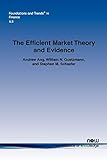The efficient market theory and evidence : implications for active investment management / Andrew Ang, William N. Geotzmann, and Stephen M. Schaefer
Series: Foundations and trends in finance ; v. 5, issue 3.Publication details: Hanover, MA : Now Publishers Inc., 2011.Description: ix, 89 p. ; 23cmISBN:- 9781601984685 (pbk.)
| Item type | Current library | Home library | Collection | Call number | Materials specified | Copy number | Status | Date due | Barcode | |
|---|---|---|---|---|---|---|---|---|---|---|
| AM | PERPUSTAKAAN TUN SERI LANANG | PERPUSTAKAAN TUN SERI LANANG KOLEKSI AM-P. TUN SERI LANANG (ARAS 5) | - | HG4636.A538 (Browse shelf(Opens below)) | 1 | Available | 00002076298 |
References : p. 73-89.
The Efficient Market Hypothesis (EMH) asserts that, at all times, the price of a security reflects all available information about its fundamental value. The implication of the EMH for investors is that, to the extent that speculative trading is costly, speculation must be a loser's game. Hence, under the EMH, a passive strategy is bound eventually to beat a strategy that uses active management, where active management is characterized as trading that seeks to exploit mispriced assets relative to a risk-adjusted benchmark. The EMH has been refined over the past several decades to reflect the realism of the marketplace, including costly information, transactions costs, financing, agency costs, and other real-world frictions. The most recent expressions of the EMH thus allow a role for arbitrageurs in the market who may profit from their comparative advantages. These advantages may include specialized knowledge, lower trading costs, low management fees or agency costs, and a financing structure that allows the arbitrageur to undertake trades with long verification periods. The actions of these arbitrageurs cause liquid securities markets to be generally fairly efficient with respect to information, despite some notable anomalies.
There are no comments on this title.

